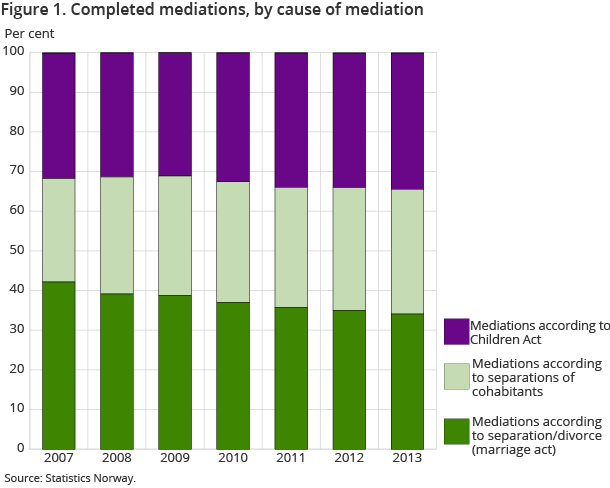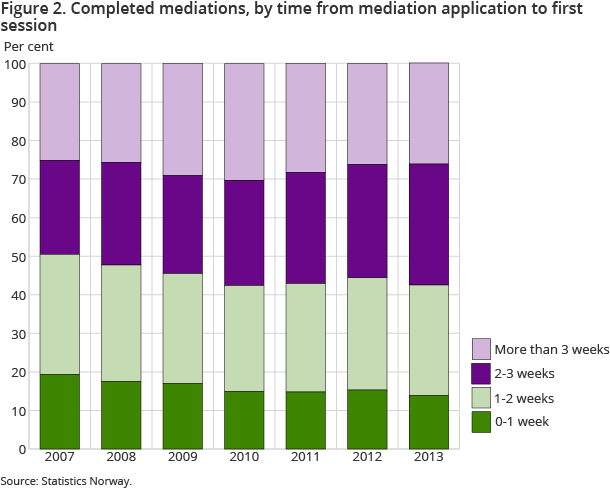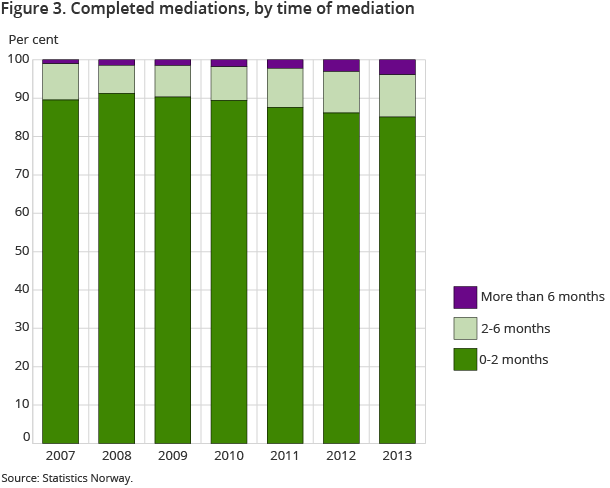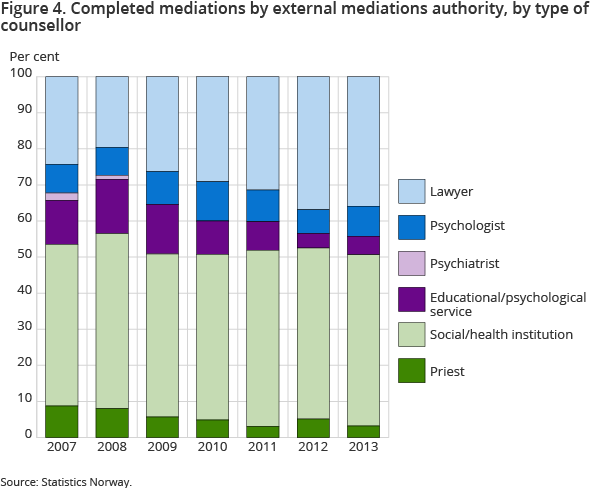Content
Published:
Share of mediations to family counselling offices up
More than 19 600 mediations for parents were completed in 2013; a decrease of nearly 4 per cent from the previous year. For the family counselling offices, this represents an increase of 3 per cent. For external mediators, however, there was a decrease of 27 per cent in the number of mediations.
| All mediation authorities | Family offices | Mediations by external counselling | Differense in per cent from the previous year. | |
|---|---|---|---|---|
| 2013 | 2013 | 2013 | 2012 - 2013 | |
| The whole country | 19 627 | 16 233 | 3 394 | -3.7 |
| Region | ||||
| Region East | 6 354 | 5 895 | 459 | -12.1 |
| Region South | 4 307 | 3 208 | 1 099 | 4.4 |
| Region West | 4 266 | 3 276 | 990 | 2.5 |
| Region Middle | 2 758 | 2 090 | 668 | 3.7 |
| Region North | 1 942 | 1 764 | 178 | -12.1 |
| Cause of mediation | ||||
| Separation/divorce (Marriage Act) | 6 684 | 5 559 | 1 125 | -6.4 |
| Separations of cohabitants | 6 187 | 5 110 | 1 077 | -2.0 |
| Mediation applications pursuant to Children Act | 6 723 | 5 532 | 1 191 | -2.6 |
| Returned from court system (Children Act) | 33 | 32 | 1 | 6.5 |




Eighty-three per cent of all mandatory mediations for cessation of cohabitation concluded in 2013 were conducted by family offices; an increase of 6 percentage points from the year before. This kind of mediation is also conducted by external mediators . The family offices concluded nearly 500 more cases in 2013 than the year before, while in the same period there was a decline of about 1 200 cases conducted by external mediators.
Fewer divorce mediations, more for cohabitation breakdowns
Mediation in connection with separation or divorce accounted for 34 per cent of all mediations, and the breakdown of cohabitation accounted for 32 per cent. Disagreements between the parents about parental responsibility, place of residence and access arrangements (mediations according to the Children Act) accounted for 34 per cent of the mediations. Few cases are referred back to mediation after they have been referred to the court system; this applied to 33 mediations in 2013.
Looking at the development in distribution of mediators by reason for mediation from 2007, which is the first year with comparative figures, we see a reduction in the proportion of mediations with “Separation or divorce (Marriage Act)” as the reason for mediation. However, there is an increase in the proportion of mediations with “Separations of cohabitants” and “Mediation applications pursuant to Children Act” as the reason for mediation.
Some longer waiting times…
In 2013, 14 per cent of the cases started within a week of the client contacting the family counselling service; a decrease of 1 percentage point from the year before. As the year before, twenty-nine per cent started during the second week. Mediation cases with a waiting time of two to three weeks represents 31 per cent of all mediations in 2013. This means that the proportion that waited between two and three weeks to start their mediation case increased by 2 percentage points compared to the previous year. The proportion of mediation cases with a waiting time of more than three weeks was, however, unchanged at 26 per cent in 2013.
During the last seven-year period, from 2007 to 2013, the trend has moved towards a smaller proportion waiting less than a week to get an appointment for mediation, while a larger proportion are waiting between one and three weeks. The proportion waiting for mediation for more than three weeks is relatively stable during this seven-year period.
…and some increase in the duration
Sixty-one per cent of the cases were concluded after the mandatory one hour; a decrease of 1 percentage point from the previous year. At the same time, the proportion of cases with a duration of 5 hours or more increased by one percentage point. This suggests an increase in the duration of the cases, measured in hours.
Eighty-five per cent of mediation cases were closed within two months. The proportion was 86 per cent in the preceding year. At the same time, there was an increase of 1 percentage point in the proportion of cases with a duration of more than two months. Thus, the duration of mediation cases measured in days was longer in 2013 than the year before. This is in line with the trend over the last seven-year period, indicating an increasing proportion of cases with a duration of more than six months from the first hour to the closing date.
Substantial reduction in the use of external mediators
In 2013, there was a decrease of 6 percentage points in the concluded cases conducted by external counselling compared to the previous year. Mediations by external counselling thus accounted for 17 per cent of all completed mediations in 2013, compared to 23 per cent in 2012.
The Family Counselling Service does not have the capacity to carry out all mediation cases by the family counselling offices. This is related to geographic and demographic conditions. However, a governing parameter was recently introduced in Bufetat, whereby family offices should conduct at least 75 per cent of all mediation cases. The reduction in the use of external mediators should be seen in light of this. In 2013, 83 per cent of all mediations were conducted by family offices. Thus, "the minimum requirement" of 75 per cent is met.
In 2013, 36 per cent of all external mediation cases were carried out by lawyers in private practice, compared to 37 per cent in 2012. Thus, the proportion of lawyers used as external mediators was reduced for the first time since 2008. As regards the proportion of mediation cases conducted by priests, there was a decrease from 5 to 3 per cent.
For "Private practice psychologists" and “Pedagogic or psychiatric services", on the other hand, there was an increase in the same period of one percentage point for each of the categories.
The statistics is published with Family counselling service.
Additional information
For more figures on mediations by region, mediation authority and cause of mediation, go to StatBank .
Contact
-
Statistics Norway's Information Centre
E-mail: informasjon@ssb.no
tel.: (+47) 21 09 46 42
